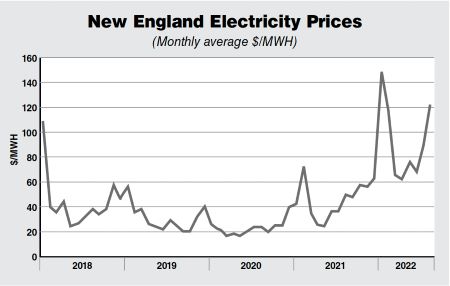By Louis Porter
Washington Electric Cooperative has filed for a 14.19% increase in its rates. The need for this increase is driven by several factors, but the primary ones are a decline in production at the Coventry landfill gas-to-electricity plant and high and volatile prices in the New England energy market that are occurring at the same time. The result is that WEC needs to buy additional power while prices for that power are high.
The result is that WEC needs to buy additional power while prices for that power are high.
The Coventry plant, which is owned by WEC, can provide 70% or more of the power used by our members. Necessary work by Casella at the landfill to expand its capacity, which began last year, resulted in less usable gas reaching WEC’s plant. That decrease in production over the winter coincided with a cold January and with global volatility in the supply and cost of energy. That was based largely on natural gas supply and cost, much of it related to the war in Ukraine.
All of this has resulted in the request to state regulators to approve an increase in rates necessary to cover those increased costs and to keep WEC on solid financial footing so it can continue providing 100% renewable electricity to our member-owners.
As members likely already know, there are several reasons that WEC’s rates for electricity are generally high compared to other Vermont utilities. The Co-op came into existence because WEC’s territory was rural and rugged, and therefore difficult to serve in a profitable way. Our part of Vermont is the most rural in Vermont, with only about nine members per mile of line.
More recently, net metering power has increased costs for WEC, which had already made investments in long-term renewable power supplies. Finally, decisions based on protecting the environment, such as stopping using nuclear power, transitioning to all renewable power, and not using herbicides in WEC’s rights-of-way have all added incrementally to the Co-op’s costs.
Between 2012 and now, WEC’s rates have increased by an average of 3.02% annually. As a co-op, WEC also returns money when the amounts collected are more than needed for operations. We’re required to raise more in revenue than it takes to operate the business. That excess revenue doesn’t belong to the Co-op. It belongs to the members, and that’s why we return it. Since 1998, WEC has returned more than $9 million to current and former members in this way: money which might have been profits for a for-profit business.
Finally, it is important to note that WEC is not alone. Other Vermont utilities have, or are expected to, file for significant rate increases this year. And much of the rest of New England has seen greater increases in the price of electricity, although it is difficult to accurately compare states in which the energy market has been deregulated to Vermont, where it has not.

We understand that none of this provides much comfort to WEC members who will likely see their power bills increase significantly. Anyone who is interested in this rate increase or in commenting on it can find that information on the Public Utility Commission electronic docket system.
Related:
Why is New England seeing increased electricity costs?
Read this news story from WBUR Boston: “Why electricity prices are rising unevenly across New England.
